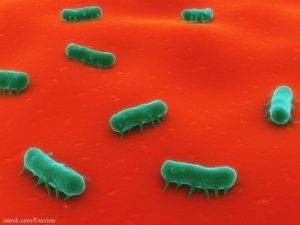The outbreak of E. coli 0157:H7 at the Ambassador Restaurant in Michigan in January 2012 and the outbreak of Salmonella Typhimurium in Hannaford ground beef late last in 2011 have some similarities. People have been sickened and had to be hospitalized after eating contaminated food.
 But while the E. coli outbreak was apparently caused by an ill employee handling food, the Salmonella outbreak was caused by a bacteria the meat industry thinks is impossible to remove from beef products.
But while the E. coli outbreak was apparently caused by an ill employee handling food, the Salmonella outbreak was caused by a bacteria the meat industry thinks is impossible to remove from beef products.
There’s another important difference. E. coli 0157:H7 is an illegal adulterant. That means it is illegal to sell food contaminated with that particular strain of bacteria. (The USDA is trying to make six other strains of shigella toxin-producing E. coli illegal too, but they are up against a lot of resistance.) The Salmonella in that ground beef, even if it’s an antibiotic-resistant strain, is perfect legal to sell. Until someone gets sick.
You may be surprised to learn that there are only three disease-causing bacteria that are considered illegal adulterants in food. They are:
- E. coli 0157:H7 in beef.
- Listeria monocytogenes in ready-to-eat foods.
- Salmonella in ready-to-eat foods.
That’s it. In other words, foods contaminated with:
- Other E. coli strains
- Campylobacter
- Salmonella in other foods
- Listeria in other foods
- Clostridium
are perfectly legal to sell in raw meats and in most other products until someone gets sick. Not only that: the USDA can’t force a recall when meat contaminated with a pathogen other than E. coli 0157:H7 has been identified. The Food Safety Modernization Act gives recall power to the FDA, but not the USDA.
Food producers and the government are counting on you to handle and store foods perfectly, and cook food thoroughly enough that any of those disease-causing bacteria are killed before consumption. If raw meat legally contaminated with Salmonella comes into contact with the cutting board you use to chop vegetables for your raw salad and you get sick, that’s just the way it is.
In an even stranger twist, large packing companies such as Excel, ConAgra, and Tyson IBP will test hamburger for bacterial contamination before they sell it to big fast food chains such as McDonald’s and Jack in the Box, but they won’t test ground beef that is sold at a supermarket to the individual consumer. In fact, McDonald’s has a more stringent Salmonella standard than the federal government.
Declaring a bacteria an illegal adulterant adds another burden onto food safety agencies and producers: they must detect the bacteria in the food before it leaves the plant and before someone buys it. That will add millions of dollars to the cost of producing food. But the annual cost of food poisoning in the United States today stands at $78 billion.
That’s why the Center for Science in the Public Interest (CSPI) filed a petition with the USDA late last year to declare antibiotic-resistant Salmonella adulterants. And why consumer groups want the government to be more proactive on this issue.





Thanks so much for your comment; the article has been amended. And I agree; I wish the USDA would act on Salmonella in meat and all of the shiga E. coli strains before another outbreak occurs.
FYI -USDA regulates most meat products so it is USDA that has announced new rules for E coli strains other than O157 (Your link is to USDA not FDA).
Also Salmonella is considered an adulterant in ready to eat foods by both the USDA (http://www.fsis.usda.gov/PDF/Salmonella_Comp_Guide_042211.pdf) and FDA (http://www.fda.gov/ICECI/ComplianceManuals/CompliancePolicyGuidanceManual/ucm074553.htm).
Other than that I enjoyed your article. I think it would be great if USDA decided to act on Salmonella in meat before people become sick.